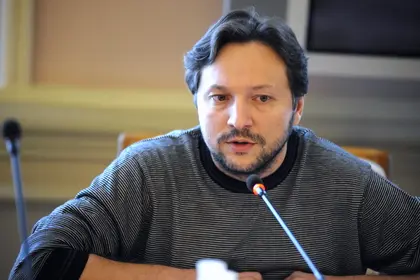The Ministry of Information — despite lacking details and debate — was passed as part of a package vote for 17 ministers on Dec. 2.
Critics immediately
compared the new ministry George Orwell’s Ministry of Truth.
JOIN US ON TELEGRAM
Follow our coverage of the war on the @Kyivpost_official.
But Yuriy Stets, the new head of the ministry, said the new agency is no threat.
His department will only respond to foreign information attacks by create country’s
information strategy and assist communication among state bodies.
But journalists and free-speech groups fear the new ministry will try to regulate the media.
“The name of this ministry alone shows it is going to be in
charge of information policy of entire country from children’s programs and up
to social advertisement,” Serhiy Leshchenko, former investigative journalist
and now a lawmaker of President Petro Poroshenko Bloc told the Kyiv Post.
“The Ukraine initiative to create a Ministry of Information a clear
threat to media freedom, this is not the way to counter propaganda,” Dunja
Mijatovic, representative on freedom of the media of Organisation for Security
and Cooperation in Europe wrote on her Twitter.
Even the procedure by which this ministry was created sparked criticism.
Leshchenko said he proposed at a meeting of his faction to remove
this ministry from the common package and vote separately for it. But it didn’t
happen. Unlike many other candidates for ministers, Stets didn’t even speak in
parliament before the vote.
A former lawmaker of the Poroshenko Bloc, Stets, 38, worked as chief
producer at Channel 5, owned by Poroshenko. He is considered to be the president’s
close ally. The fast promotion of Stets as a new minister signaled that the president is strongly pushing this idea.
Stets made public the
regulations of the new ministry, a draft of which he prepared back to
2007-2009, only a day after the vote. He said he used the experience of Great Britain and France after World War I, as well as the experience of Israel.
Сritics say some features are scary.
The ministry is going to “develop and implement professional
standards in media sphere,” “ensure freedom of speech” and it should also
prevent harm caused to people by “incomplete, outdated or unreal information.”
Other norms seem outdated, like the appointing the heads of
state media enterprises, when Ukraine announced a move for reduction of state
media. Some of them are just useless, like the aim to conduct media monitoring
and preparing reports on information projects for the president and prime minister, a job that could be done by press services.
“This is going to be a mega-giant that will take over all the
functions for regulation of information policy,” said Svitlana Zalishchuk, a former civil activist and now a lawmaker with Poroshenko Bloc. She called on Stets
to put the new ministry on hold and re-write its regulations together with
media experts, especially in light of Ukraine’s financial crisis.
Many believe the creation of new ministry would be a waste of
money. “The country is now collecting money for bullet-proof vests but we found
money for the ministry,” said Nastia Stanko, a journalists of Hromadske TV
channel.
But Stets assured his ministry was going to use budget funds only
for salaries of its staff and hopes to rely on foreign donors or grant
money for other expenses, which he already did working as a chief of the information department of the National Guard.
Stets claimed he needed the new ministry because while serving in the National Guard he
didn’t have enough authority to resist Russian information aggression. “Every
day at schools in newly liberated territories (of eastern Ukraine) we are being
called junta at schools,” he said.
Stets said he was ready to review the ministry’s regulations, but
he couldn’t delay creation of this ministry as loss of time would mean more losses in the information war. The final approval of regulations of new ministry
should be complete in the next few days.
Stets said every ministry could potentially pose risks for journalists’ ability to disseminate public information. “This ministry will no way try to impose censorship or restrict
freedom of speech,” he assured.
But Leshchenko believes that the Ministry of Information should be
dissolved and Stets has to either go back to parliament or to become head of a state body highly specialized at countering the information war against Russia, but without any other powers.
If he doesn’t do this, it will bring to further image losses of
the country and a need for journalists to unite and demand the ministry’s
abolishment by street actions. Leshchenko believes Poroshenko has already lost
in his popularity by promoting of the useless ministry.
“One stupid decision of parliament will lower Poroshenko’s rating
by three or even five percent,” he said.
Kyiv Post staff writer Oksana Grytsenko can be reached at grytsenko@kyivpost.com
You can also highlight the text and press Ctrl + Enter




